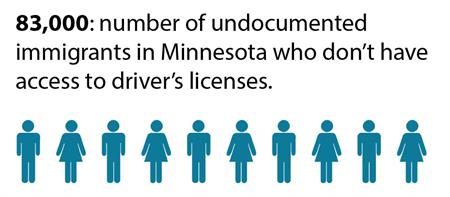Many Minnesotans never give their driver’s license a second thought. It’s the card that remains nestled in their wallets whenever they take to the highways. But for some Minnesotans, getting a driver’s license is impossible, which makes it difficult to get to their jobs, get their kids to school, or even buy food at the grocery store.
Minnesota is home to an estimated 95,000 undocumented immigrants.[1] Some have been here and working for years, some came here as children, and some have come to the country more recently. Many are working in jobs across the state, and are contributing to our state economy. These Minnesotans could make an even larger contribution by putting their skills fully to work for the state’s economy if they could gain the ability to get driver’s licenses.
Expanding Access to Driver’s Licenses is a Common-Sense Way to Build the Economy

With relatively low unemployment today, and a projected labor shortage as a large share of the population ages out of the workforce, Minnesota can’t afford to leave qualified workers on the sidelines because they are unable to get to work. If Minnesota’s undocumented workers could gain driver’s licenses, they could get to their jobs safely and reliably, more easily get to good jobs, have more options for their work schedules, and better put their full skills to work in Minnesota’s economy. As these Minnesotans are able to access greater job opportunities, they are likely to increase their earnings, which also creates a boost in consumer spending and the economy in communities throughout Minnesota.
Until recently, undocumented immigrants in Minnesota could attain a driver’s license by showing their birth certificates and successfully completing a driver’s test. However, after an administrative change in 2003, Minnesota began to require proof of legal immigration status to apply for a driver’s license. Currently, only Minnesotans who are legal citizens or Deferred Action for Childhood Arrivals (DACA) recipients can apply for a driver’s license.[2]
This means that about 83,000 Minnesotans aged 16 and older cannot get driver’s licenses, which can make it difficult for them to reliably get to their jobs or school.[3] They currently must either rely on public transportation, which is not available in all parts of the state, or take a personal risk by driving without a driver’s license. Immigrants who drive without a license report feeling vulnerable to possible deportation if they are stopped for even a minor violation.[4] A mother or father driving to work in the morning shouldn’t have to fear being permanently separated from their family and home if they are stopped for having a broken tail light on their vehicle.
Driver’s Licenses for All Drivers Would Keep Our Roads Safer
Allowing all Minnesotans to apply for a driver’s license would also keep our roads safer. When everyone takes a driving test before getting behind the wheel, then all drivers will better know the rules of the road. And when undocumented immigrants have legally issued driver’s licenses, they may be more comfortable reporting an accident if they are involved in one or witness one.
More undocumented immigrants would have access to auto insurance as well, and as a result, Minnesota will have fewer uninsured drivers on the road. A larger insurance pool also could help hold down premium costs for all Minnesota drivers.
Time to Make Driver’s Licenses Available to All Minnesotans
The Minnesota Legislature has considered allowing undocumented immigrants to present a foreign passport and birth certificate as proof of their identity in order to apply for a driver’s license.[5] This policy change was included in the Senate’s omnibus transportation bill in 2015, but was not passed into law. Failure to pass this legislation was a missed opportunity to strengthen Minnesota’s economy. The sooner policymakers act so more Minnesotans can gain a driver’s license, the sooner these Minnesota workers can fully contribute to the state’s strengthening economy.
By Clark Biegler
[1] Pew Hispanic Center, Unauthorized Immigrants in the U.S., 2012, November 2014.
[2] Deferred Action for Childhood Arrivals, a federal policy created in 2012, allows immigrants who entered the country as children to request deferred action, or relief from deportation, and work authorization.
[3] Minnesota Budget Project estimate of the number undocumented immigrants in Minnesota who are 16 or older and have not already been approved for DACA.
[4] The Advocates for Human Rights, Moving From Exclusion to Belonging, March 2014.
[5] Senate File 224, lead author Senator Bobby Joe Champion, and House File 97, lead author Representative Rod Hamilton.